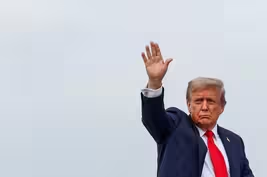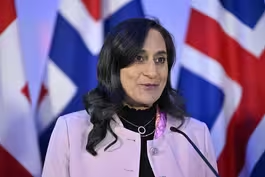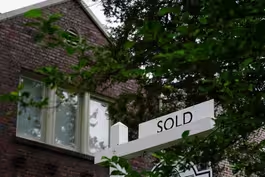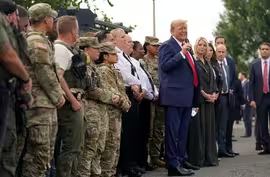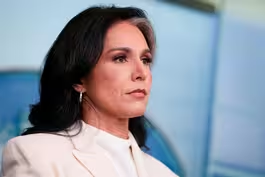
Why the federal government could take a stake in Intel
Clip: 8/21/2025 | 6m 28sVideo has Closed Captions
Why the federal government could take a stake in Intel
President Trump is weighing taking a 10% stake in computer chip maker Intel. If approved, it would mark one of the largest U.S. government interventions in a private company since the auto bailout of 2008. Amna Nawaz discussed more with Peter Harrell of the Carnegie Endowment for Peace. He is a former White House economic advisor in the Biden administration.
Problems playing video? | Closed Captioning Feedback
Problems playing video? | Closed Captioning Feedback
Major corporate funding for the PBS News Hour is provided by BDO, BNSF, Consumer Cellular, American Cruise Lines, and Raymond James. Funding for the PBS NewsHour Weekend is provided by...

Why the federal government could take a stake in Intel
Clip: 8/21/2025 | 6m 28sVideo has Closed Captions
President Trump is weighing taking a 10% stake in computer chip maker Intel. If approved, it would mark one of the largest U.S. government interventions in a private company since the auto bailout of 2008. Amna Nawaz discussed more with Peter Harrell of the Carnegie Endowment for Peace. He is a former White House economic advisor in the Biden administration.
Problems playing video? | Closed Captioning Feedback
How to Watch PBS News Hour
PBS News Hour is available to stream on pbs.org and the free PBS App, available on iPhone, Apple TV, Android TV, Android smartphones, Amazon Fire TV, Amazon Fire Tablet, Roku, Samsung Smart TV, and Vizio.
Providing Support for PBS.org
Learn Moreabout PBS online sponsorshipKAROLINE LEAVITT, White House Press Secretary:# The president wants to put America's needs first,## both from a national security and economic# perspective.
And it's a creative idea that## has never been done before to ensure that we're# both reshoring these critical supply chains,## while also gaining something of# it for the American taxpayer.
AMNA NAWAZ: That was White House Press Secretary# Karoline Leavitt explaining why the president is## weighing taking a 10 percent stake in computer# chipmaker Intel.
If approved, it would mark one## of the largest U.S. government interventions in# a private company since the auto bailout of 2008.
It's the latest in a series of actions# by the administration to take direct## financial interest in American businesses.
Joining me now to discuss this is Peter# Harrell from the Carnegie Endowment for## International Peace.
He's a former White House# economic adviser in the Biden administration.
Peter, welcome to the "News# Hour."
Thanks for joining us.
PETER HARRELL, Carnegie Endowment for# International Peace: Thanks for having me on.
AMNA NAWAZ: So, before we get# to the bigger picture here..
I just want to ask you# about Intel specifically.
If this deal goes through, the U.S. becomes the# largest shareholder in Intel.
In your view,## is it a good idea for the# government to take this move,## to essentially pick and put a thumb on the# scale among the many chipmakers in America?
PETER HARRELL: Well, I think it would be# fair to count me as skeptical that this## is the right way either to save Intel or to# help build U.S. semiconductor manufacturing.
I think there is bipartisan support.# We worked on it when I was in the Biden## administration to going back to Trump's# first term.
There is bipartisan support## in Washington for the idea that we need to be# building more leading-edge semiconductor chips## here in the United States.
That's why we have# had the CHIPS program to provide incentives for## reshoring semiconductor manufacturing# going back for five or six years now.
What's different is whether taking a 10# percent stake in the company is really## the most effective way to do that.
I don't# really see how taking 10 percent of Intel## is either going to help turn Intel# around or help this reshoring agenda.
AMNA NAWAZ: Are there questions around the# legality of this move as well?
I mean, back during## the financial crisis of 2008, it was Congress# that authorized specific bailouts for specific## auto companies and banks.
That's not the case# this time.
Is this legal for the president to do?
PETER HARRELL: No, I think# there are questions about## legally how they are going to structure this.
So, if we look back, back in 2022, so three or# four years ago now, Congress appropriated money## for the CHIPS Act.
The CHIPS Act had actually# preceded getting money.
Congress appropriated## money.
And then the Commerce Department# went through a period of giving grants,## which are clearly authorized by the CHIPS# Act, to a range of companies, including Intel,## including a company called TSMC, which is a# Taiwanese company, including Samsung and others,## to give those companies incentives to# build semiconductors here in the U.S. And the reason that the government didn't# take ownership in those companies then was## really twofold.
First, there's a question# about whether it's legal.
But, second,## these are companies -- these are not -- this is# not a bailout situation.
These are companies that## had been making chips very profitably overseas,# and the government wants them to do it here.
And had the government said, we're going to take# equity in you if you come to the United States,## the companies just would have said, thanks,# but no thanks.
We're fine manufacturing in## Taiwan and Singapore and Korea and places# like that.
So I don't think that taking## equity is really about -- very helpful# to getting the companies to onshore.
Now, Intel is a little bit different because Intel# over the last couple of years has had some serious## technological problems, some serious business# problems.
Again, we still have to get through,## is this really legal?
And I think it would be# helpful for the Trump administration to spell out## its legal rationale, because it was definitely# not originally contemplated in the CHIPS Act.
AMNA NAWAZ: So put this into some larger# context for us here.
If this deal goes through,## and that is still an if, it would# just be the latest example of the## Trump administration essentially taking# a cut from different American companies.
They're sharing in profits from Nvidia and# AMD sales of computer chips to China.
It's## taken a share in U.S. Steel as part of a# deal that would approve its merger with## Nippon Steel.
Bigger picture here,# Peter, what do you see going on?
PETER HARRELL: I mean, this is very# different from what we have seen in## the U.S. over at least the sort of 80# years since the end of World War II.
As you alluded to, there is some history# in the context of financial crises or other## kinds of crises the government taking# some stake in companies as part of## a bailout.
We saw that during the financial# crisis.
We also saw it some during## the COVID pandemic in 2020, where some of# the COVID relief the government enacted was## tied to the government getting some stakes# in companies that were getting bailed out.
But these have traditionally been short term# stakes, the government saying, we will take a## stake to get you through the tough times and then# we're going to sell it off.
This is much more of a## scenario where the president is saying he# wants the government to own stakes, not## just in companies that are failing, but in a whole# bunch of companies on a kind of open-ended basis,## very different from the way the U.S. has operated# on our economic model over the last 80 years.
And I think it's going to raise# a bunch of questions about,## are the -- is the government really going# to be the right shareholder to help these## companies succeed?
Is the government going to# start showing favoritism to these companies## over companies that it doesn't own?
What are# the kind of political requirements that are## going to be put on companies that the# government is taking an ownership in?
Because this is just not a business model that# has been the way the U.S. government and the## private sector have interacted in kind of the# modern era that we have all lived through.
AMNA NAWAZ: Peter Harrell from the Carnegie## Endowment for International Peace,# thank you so much for joining us.
PETER HARRELL: Thanks for having me.
Appeals court dismisses $500M fraud penalty against Trump
Video has Closed Captions
Clip: 8/21/2025 | 7m 56s | New York appeals court throws out $500M fraud penalty against Trump (7m 56s)
Canada's foreign minister on the future of U.S. relations
Video has Closed Captions
Clip: 8/21/2025 | 9m 8s | Canada's foreign minister on U.S. relations and security guarantees for Ukraine (9m 8s)
July home sales up, offering momentum to struggling market
Video has Closed Captions
Clip: 8/21/2025 | 5m 46s | Home sales went up in July, offering momentum to a struggling market (5m 46s)
News Wrap: Trump greets National Guard troops in D.C.
Video has Closed Captions
Clip: 8/21/2025 | 10m 25s | News Wrap: Trump greets law enforcement and National Guard troops patrolling D.C. (10m 25s)
Tour of giant fantastic animals celebrates art of Oaxaca
Video has Closed Captions
Clip: 8/21/2025 | 5m 20s | Tour of giant, brightly colored creatures celebrates artistic heritage of Oaxaca (5m 20s)
What Gabbard's ODNI cuts mean for U.S. intelligence agencies
Video has Closed Captions
Clip: 8/21/2025 | 7m 31s | What Gabbard's ODNI cuts mean for U.S. intelligence agencies (7m 31s)
Providing Support for PBS.org
Learn Moreabout PBS online sponsorship
- News and Public Affairs

FRONTLINE is investigative journalism that questions, explains and changes our world.

- News and Public Affairs

Amanpour and Company features conversations with leaders and decision makers.












Support for PBS provided by:
Major corporate funding for the PBS News Hour is provided by BDO, BNSF, Consumer Cellular, American Cruise Lines, and Raymond James. Funding for the PBS NewsHour Weekend is provided by...
